|
|
|
Sort Order |
|
|
|
Items / Page
|
|
|
|
|
|
|
| Srl | Item |
| 1 |
ID:
187111
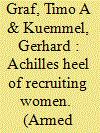

|
|
|
|
|
| Summary/Abstract |
The German Bundeswehr, like other NATO forces, seeks to recruit more women in order to improve its gender balance and to meet its personnel needs. However, previous research on military recruitment has paid little attention to women. Given that the (German) military is still a male-dominated organization, we argue that women’s opinion regarding the realization of gender equality in the military may very well be the Achilles heel of recruiting women. Based on the assumption that women value gender equality in the work environment, we test the hypothesis that women are more attracted to the military as a (potential) employer, the more they think the military has achieved gender equality. A multivariate analysis of nationally representative survey data from Germany from 2019 provides empirical evidence to support this hypothesis. Practical and theoretical implications are discussed.
|
|
|
|
|
|
|
|
|
|
|
|
|
|
|
|
| 2 |
ID:
141172
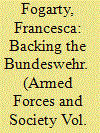

|
|
|
|
|
| Summary/Abstract |
Along with Germany’s suspension of the Wehrpflicht (mandatory service requirement) in 2011, the Bundeswehr has been reformed to accommodate an all-volunteer force. In the years that followed, studies were conducted to determine the state of civil–military relations in Germany via the opinions of military leadership regarding the reforms and via the opinions of civilians on their perspective of the military in general. This study provides additional data from the perspective of young soldiers (n = 347) at the Universität der Bundeswehr München and the Helmut Schmidt Universität in Hamburg regarding the civil–military relationship in Germany as of early 2014. The results indicate that the majority of these young soldiers are satisfied with their decision to join the Bundeswehr, yet they feel unsupported and underappreciated by the society they serve.
|
|
|
|
|
|
|
|
|
|
|
|
|
|
|
|
| 3 |
ID:
123567
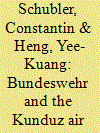

|
|
|
|
|
| Publication |
2013.
|
| Summary/Abstract |
The article sets out to investigate Germany's involvement in the controversial 2009 Kunduz air strike in Afghanistan. Utilizing a theoretical framework derived from existing literature on postheroic warfare, it employs a detailed case study of this particular military engagement to highlight the operational, strategic, and cultural dimensions of Germany's operations in Afghanistan. Through an analysis of primary documents and field interviews, this paper concludes that German public opinion, politicians, soldiers and media reacted in ways that mirror closely theories of postheroic warfare. These included widespread condemnation of the air strike, increasing doubts about the Afghan mission, and emphasis on low-risk stand-off precision weapons, which paradoxically resulted in higher civilian casualties. Germans still have a long way to go to accept the brutal realities of military engagements that the Bundeswehr increasingly confronts during its expanded scope of post-cold war military operations.
|
|
|
|
|
|
|
|
|
|
|
|
|
|
|
|
| 4 |
ID:
189286


|
|
|
|
|
| Summary/Abstract |
The author, viewing a "cold war" as a form of the establishment of a new world order, examines Germany's approach to involvement in the US-China confrontation and the establishment of a German military presence in the Asia-Pacific region as part of the country's attempts to become a global power. The author stresses Germany's reluctance to participate in the "containment" of the PRC from 2014 to 2019 and presents reasons for it, including the cold war between the Euro-Atlantic community and Russia. The author identifies a group of factors that prompted Germany to transition to an accelerated scenario of introducing a military presence in the Far East in 2020 and 2021. Those factors are the rapid withdrawal of the Bundeswehr from Afghanistan, the COVID-19 pandemic, and the election of Joe Biden as US president. Starting in February and March 2021, Germany contributed to pressure on China, but strictly limited its volume and degree. This paper examines the trends and manifestations of the German shift to advanced security and defense cooperation with Singapore and Japan in the late 2010s and early 2020s. The creation of AUKUS (September 15,
|
|
|
|
|
|
|
|
|
|
|
|
|
|
|
|
| 5 |
ID:
132841
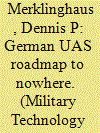

|
|
|
|
|
| Publication |
2014.
|
| Summary/Abstract |
The Bundeswehr understands and wants to acquire UAS, but is confronted by hard opposition that does not see the necessity for these aircraft.
|
|
|
|
|
|
|
|
|
|
|
|
|
|
|
|
| 6 |
ID:
147165


|
|
|
| 7 |
ID:
189926
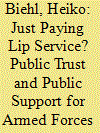

|
|
|
|
|
| Summary/Abstract |
The article presents an empirical analysis of whether, how, and why people are active to either support or protest against the Bundeswehr. Public opinion polls consistently report high levels of trust in the military. According to the social-psychological approach of participation theory, this trust should lead to corresponding actions. However, the literature on civil–military gaps claims that the majority of people pay mere lip service to soldiers rather than actively support the armed forces. No active support despite high levels of trust? In an effort to empirically test the level and the determinants of the public’s support for and protest against the military, an activity scale was included in a representative opinion poll in Germany. The analyses show that a fairly large part of the German population engages in activities that support the Bundeswehr and that public trust in the military predicts that supportive behavior. Importantly, trust in the armed forces remains a strong predictor of citizens’ activities related to the armed forces even when controlling for numerous other factors. Taken together, these findings contradict the widely shared view of a civil–military gap and instead provide empirical evidence for the social-psychological approach of participation theory.
|
|
|
|
|
|
|
|
|
|
|
|
|
|
|
|
| 8 |
ID:
146913
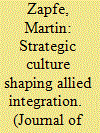

|
|
|
|
|
| Summary/Abstract |
With the Afghan mission winding down, the German Bundeswehr is in the process of implementing a new doctrinal system, resting on the adoption of NATO doctrine and a new joint operational doctrine. This is a historical first, which this paper argues is explained by two factors: functionally, for armed forces deeply integrated into NATO, the practical need for a joint operational doctrine did not exist. More importantly, culture matters: Germany features a highly institutionalized strategic culture that places distinct limits on some forms of joint doctrine. Thus, while impressive and logical, current doctrinal plans of the Bundeswehr, relying as they do on an ‘alliance shortcut’, raise important questions that need to be answered to ensure continuously functioning civil-military relations.
|
|
|
|
|
|
|
|
|
|
|
|
|
|
|
|
| 9 |
ID:
102842
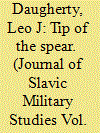

|
|
|
|
|
| Publication |
2011.
|
| Summary/Abstract |
Starting with the election of Germany's first postwar government in 1949, the Western Allies, most notably the United States and Great Britain, came to the conclusion that in order to strengthen the defenses of Western Europe against a possible Soviet invasion, a viable German Army, free of the militarism and influence from its World War II predecessor, would be necessary for the defense of not only Germany but of Western Europe itself. After surmounting serious French objections to the creation of standing German Army on its border, the government of Chancellor Konrad Adenauer set about to create a West German Army or "Bundeswehr" based on democratic principles and practices. This article, the first of four on the post-World War II German Armed Forces, is a history of the problems, organization, and fielding of what became the "tip" of NATO's sharp spear guarding against the Soviet Army from overrunning Western Europe - the West German Bundeswehr.
|
|
|
|
|
|
|
|
|
|
|
|
|
|
|
|
| 10 |
ID:
121008


|
|
|
|
|
| Publication |
2012.
|
| Summary/Abstract |
After the decision to re-arm Germany in the early 1950s, the military leadership in the Federal Republic of Germany or "Bundeswehr" once again set out to create an army capable of not only defending the Federal Republic of Germany but of being able to integrate itself within the framework of the North Atlantic Treaty Organization's (NATO) forward defense of Western Europe. This article examines the Bundeswehr's re-armament and its operational and tactical organization as well as the weapons systems, most notably the development of a whole new generation of main battle tanks and infantry fighting vehicles or personnel carriers that were far superior to either their Soviet or American counterparts. The article likewise examines the incorporation of tactics and operational doctrine employed by the Wehrmacht on the Eastern Front (1941-1945) during World War II.
|
|
|
|
|
|
|
|
|
|
|
|
|
|
|
|
| 11 |
ID:
138741
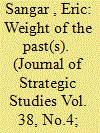

|
|
|
|
|
| Summary/Abstract |
This article seeks to explain the basic dynamics of the development of the German military approach in Afghanistan between 2003 and 2010 by looking at the impact of the Bundeswehr’s established uses of historical experience. First, the German military approach in Afghanistan has slowly evolved from a peacebuilding and mediation mission towards a full-fledged combat deployment. Second, the Bundeswehr’s exclusive focus on the World War II experience has contributed to the emergence of the Balkans experience as a formative experience that shaped initial operational thinking in Afghanistan. Third, because a thorough debate on the historical foundation of counterinsurgency remained absent, the operational shift in 2009 was perceived as a return to ‘classical’ military tasks and thus led to an almost exclusive focus on training for combat.
|
|
|
|
|
|
|
|
|
|
|
|
|
|
|
|
| 12 |
ID:
192140
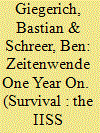

|
|
|
|
|
| Summary/Abstract |
In response to Russia’s invasion of Ukraine on 24 February 2022, German Chancellor Olaf Scholz announced a Zeitenwende, or historical turning point, for German foreign and defence policy. Expectations of profound German geopolitical, geostrategic and geo-economic transformation were raised both in Germany and among Berlin’s allies. One year later, Germany’s greatest success has come in the geo-economic arena, where progress has been made to reduce Germany’s energy imports from Russia. Geopolitically, the picture is less convincing. While Scholz has committed to the defence of NATO territory against potential Russian aggression, it is not obvious whether the German government really perceives Russia as a direct threat to the country. Berlin has yet to formulate a convincing geopolitical leadership role in Europe, and it remains to be seen if the new defence minister, Boris Pistorius, will succeed in giving shape to much-needed Bundeswehr reform and resolve major readiness and procurement challenges. Consistent pressure from NATO allies will be needed to help bring about major change to Germany’s strategic and defence policy.
|
|
|
|
|
|
|
|
|
|
|
|
|
|
|
|
|
|
|
|
|